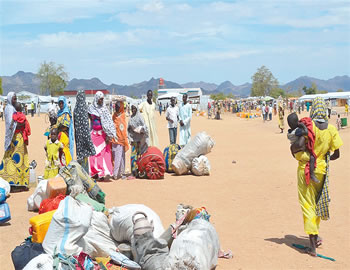It is no news that Nigeria is one of the countries with the highest number of Internally Displaced Persons. Conflicts, clashes and wars have led to a lot of people being internally displaced. Record has it that Nigeria has over four million IDPs who were forcefully sent out of their communities and homes due to conflicts as at the beginning of 2016. Unfortunately, this figure keeps increasing by the day as more clashes and conflicts are being witnessed from different parts of the country, especially in the North-East.
According to the Displacement Tracking Matrix in 2018, 541,000 new displacements were recorded in Nigeria. For some, it was as a result of flood. In the North-East, it was as a result of the Boko Haram insurgency, while in the Middle Belt, it was due to the farmers /herders and inter-tribal clashes.
Buhari replaces Osinbajo’s economic management team with Salami-led economic advisory council
Obviously, these IDPs, who are mostly women, lost their husbands and children. Some of them even lost all members of their families and with no means of livelihood, thereby becoming refugees in their own father’s land. They are thrown into psychological and emotional trauma with no hope of what tomorrow brings.
In Nigeria, most of the IDP camps are built by either the government or non-government organisations. Sadly, some are just temporary tents with no security and protection from insects and reptiles. However, these camps are overcrowded and some lack the basic facilities needed to sustain the Internally Displaced Persons.
Most of the camps are old and need to be renovated. The environments are dirty and not safe for living. In fact, record has it that most IDP camps in Nigeria do not have social amenities like electricity, good roads, water, toilets and even schools. Those that are opportune to have boreholes do not have generators or electricity to help pump the water. They are prone to sicknesses and diseases with neither doctors nor drugs at the clinics. Death stares them in the eyes to remind them of their loved lost ones. What a sad story to tell! To worsen the situation, some women are even raped and infected by people who are supposed to protect them, while the unlucky ones carry unwanted pregnancies as a reminder for the rest of their lives.
To this end, it is imperative that the government should give more attention to the plight of the IDPs. There is need to provide them with basic social amenities to help alleviate their sufferings. Non-government organisations should be applauded for their contributions, but they cannot do it alone.
Therefore, we call on religious bodies, institutions, organisations, philanthropists, traditional rulers, politicians and others to come to the aid of the IDPs. Let us put a smile on their faces and make the world a better place for them. We all know that the entire human race needs a place they can call a safe haven, and this can only be gotten by our collective efforts.
Deborah Phillips
Kano.






